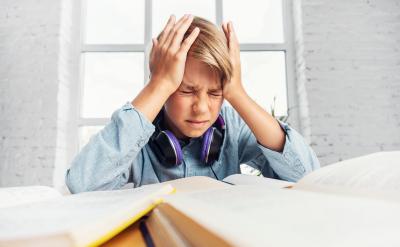Headaches

Headaches are very common in children, especially in adolescents. It is confusing to know how to respond to the complaint of a headache in your child, so here is how we assess ongoing headaches in the office:
So, what are the possible causes for a headache?
Very common causes include:
- Tension headaches (read more below)
- Stress, anxiety, or depression symptoms
- Migraines (read more below)
- Infections including common colds, flu, and sinus infections
Less common causes include:
- Head injury, concussion
- Medication side effects
- Some much less common causes of headaches are: Cluster headaches and from high blood pressure, meningitis, brain tumors, brain bleeds
Tension headaches and migraine are typically more intense types of headaches and can be recurring. Recurrent headaches are more common in children whose parents or other relatives experience headaches.
Symptoms of recurrent headaches include:
- Tension headaches:
Usually involves the entire head, pressure or tightness that comes and goes, can last anywhere between 30 minutes and 7 days
- Migraines: Across the entire forehead, both temples or 1 temple usually hurts, moderate to severe intensity, throbbing, worse with physical activity, can last up to 3 days, sometimes accompanied by nausea, vomiting, light or sound sensitivity, auras (unusual visual or other sensations before the headache occurs)
So what do you do if your child has a headache?
Here’s what you can do at home to treat a headache:
- Take a weight-appropriate dose of ibuprofen/Motrin (preferred over Tylenol) and drink a glass of water at the START of a headache.
- Rest!
- Try a heating pad or ice pack.
- Massage the head and neck.
To avoid recurrent headaches (that are not directly related to an illness or specific cause), there are some important things you can do that may reduce the severity, length and quantity of headaches.
How can you prevent or reduce the severity of recurrent headaches?
- Get daily exercise for 20-30 minutes
- Reduce screen time to 2 hours or less per day
- Ensure good sleep- approximately 8-11 hours/night
- Drink plenty of water- 80-100 oz/day in adolescents
- Avoid caffeine
- If headaches are recurrent, start tracking the headache symptoms, frequency, possible triggers, and remedies tried. Make an appointment with your pediatrician to discuss your observations.
When should you call the pediatrician regarding your child’s headaches?
- When headaches are becoming more frequent (especially more than 2 times/week)
- When headaches are becoming more severe/painful
- When headaches awaken the child from sleep or happen consistently after awakening
- When headaches get worse with coughing, sneezing, physical activity, urinating, or having a bowel movement
- When headaches are accompanied by nausea or vomiting
- When headaches occur in the back of the head (aka occipital)
- When headaches worsen when laying down
- When headaches do not go away with medication
- When headaches are in a child < 6 years old
- Or if you are concerned for any other reason! (You know your child best and know when something is “off”.)
Go to the emergency department if your child has headache with vomiting, neck stiffness, or other severe symptoms (including vision problems, confusion, numbness, tingling, lethargy, problems walking)
We hope this information was helpful in understanding the many causes and variations of headaches in children. In general most headaches are benign. If you have any questions, please call our office to speak with a triage nurse or make an appointment if needed.
For additional information about headaches, visit: healthychildren.org
